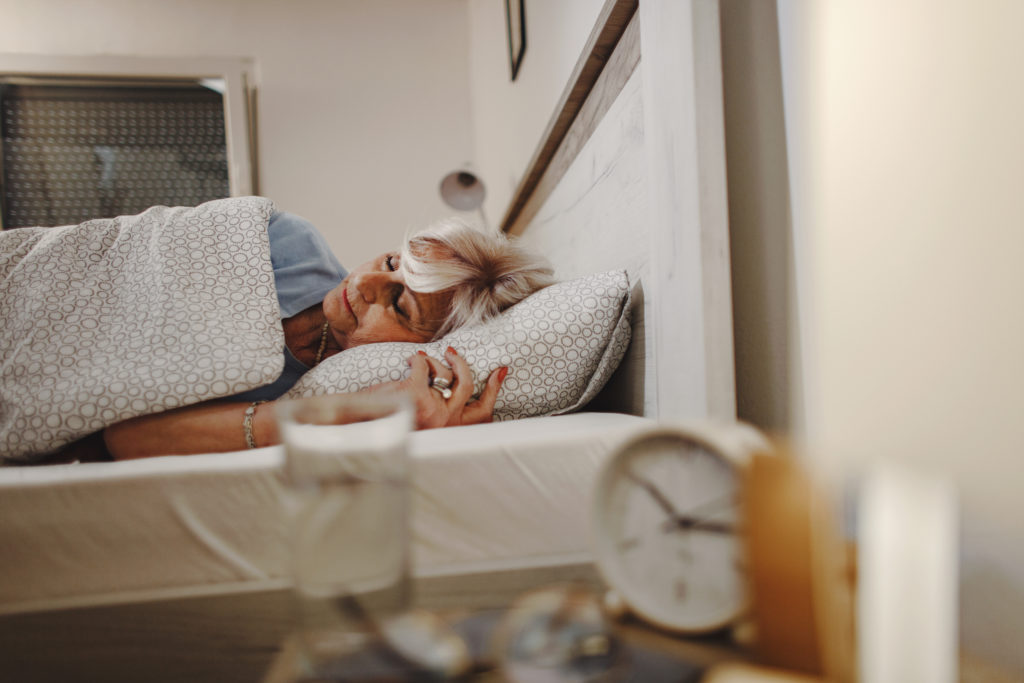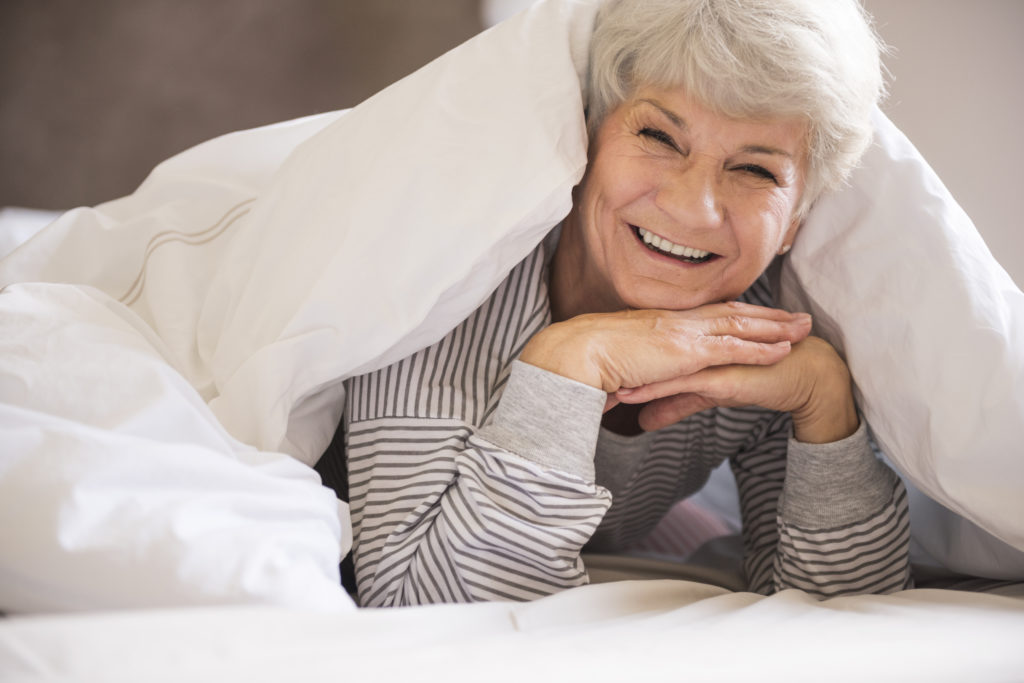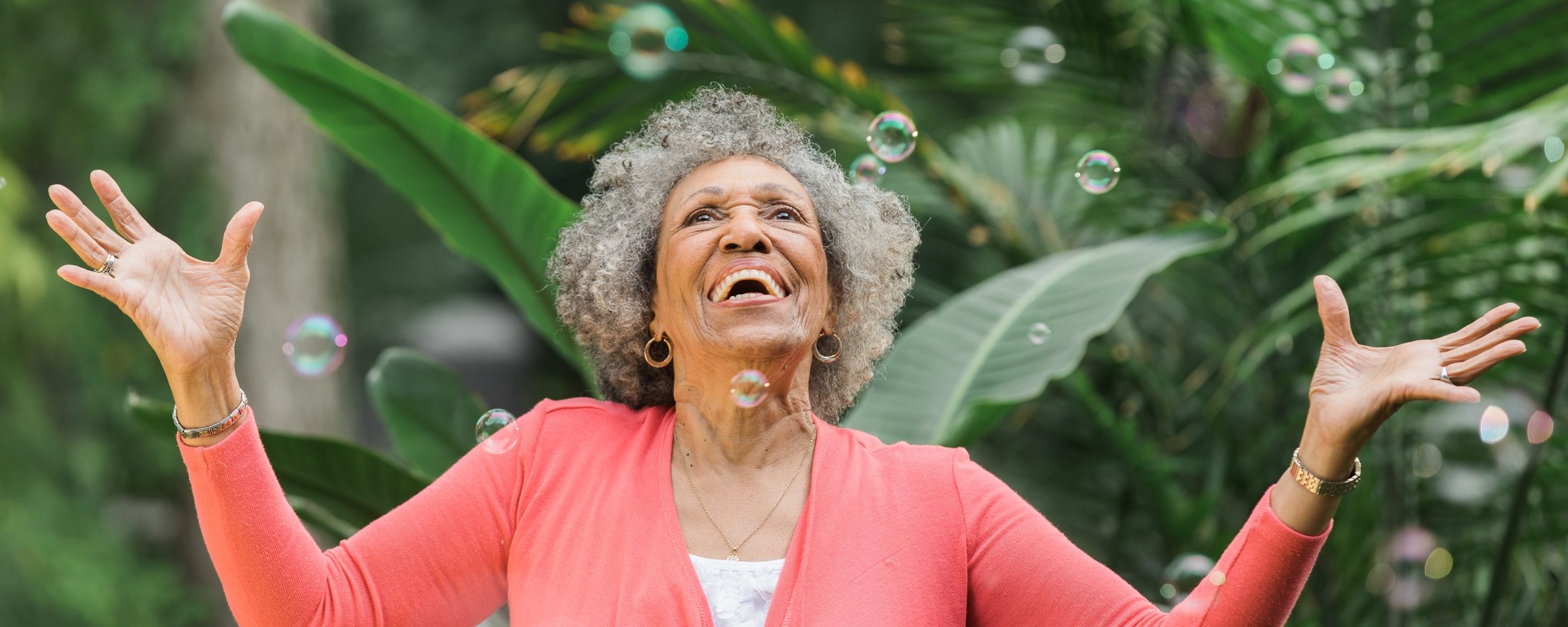Better Sleep for Seniors: Winter Tips for a Cozy Slumber
Senior Tips | January 31, 2023
Everyone loves a good sleep, right? But what if you don’t sleep well during the winter months? Those dark winter mornings can be rough to get out of bed. Have you been having difficulty getting to sleep lately? Everyone knows that Winter is the season of hibernation and slumber. But there are situations in which you can’t stay under the covers all night. This can be due to your daily schedule, or simply because your mind keeps running on overtime and you just can’t find rest, despite all your efforts. Winter can be a tough time for seniors when it comes to getting a good night’s sleep. Cold temperatures and shorter days can make it difficult to fall asleep and stay asleep throughout the night. So, elder care must need expert precautions during this season.

Do you wake up feeling tired every morning and wonder if this is normal for your age? If so, there are some simple tips to help improve your sleep, no matter how old you are. Here are some tips and tricks to help you have a better night’s sleep this post-holiday season.
Soothe Your Way to Sleep
Taking a warm bath or shower before bed can be an effective way to relax your body and mind before going to sleep. The warmth of the water can help to soothe sore muscles and ease tension, making it easier for you to fall asleep. The heat of the water can also cause your body’s temperature to rise, which can simulate the natural temperature drop that occurs when you fall asleep. This can make it easier for your body to transition into sleep mode. Additionally, the act of taking a warm bath or shower can also be calming and meditative, helping to clear your mind and reduce stress. This can be especially beneficial if you have trouble falling asleep due to racing thoughts or anxiety.
Overall, taking a warm bath or shower before bed can be a simple yet effective way to improve your sleep. So, in elder care remind your loved ones to take a warm shower or bath.
Keep your bedroom warm
Keeping your bedroom warm is essential for a good night’s sleep during winter season. A cool bedroom can make it difficult to fall asleep and stay asleep throughout the night. It can cause discomfort, shivering, and discomfort to your body, making it hard for you to relax and fall asleep. To ensure a comfortable sleeping environment, it’s recommended to keep your bedroom at a temperature between 60- and 67-degrees Fahrenheit. This temperature range is considered ideal for most people as it allows for optimal comfort and promotes restful sleep.
If the room is too cool, you can use extra blankets or a heating pad to keep warm during the night. This can be especially helpful for senior citizens who may have a harder time regulating their body temperature or may have health conditions that make them more susceptible to the cold. Additionally, using a humidifier in your bedroom can also help to keep the air moist, which can help to prevent dryness and irritation of the airways.
So, for your elder care in the winter season always make space for extra blankets, heating pads, and humidifiers.
Invest in a good mattress and pillow

Investing in a good mattress and pillow is crucial for seniors to get a good night’s sleep during the winter season. A comfortable and supportive sleeping surface can help alleviate aches and pains, reduce tossing and turning, and promote restful and rejuvenating sleep. A mattress that is too soft can lead to poor spinal alignment, which can cause pain and discomfort throughout the night. On the other hand, a mattress that is too firm can also be uncomfortable and can cause pressure points. Therefore, it’s important to find a mattress that provides the right balance of support and comfort.
Additionally, a pillow that is not supportive enough can cause strain on the neck, leading to pain and discomfort. A pillow that is too thick or too thin can also cause the head to be tilted too far forward or backward, putting strain on the neck and shoulders. Therefore, it’s important to find a pillow that provides the right level of support for your neck, so that it can maintain proper alignment throughout the night.
In summary, a good mattress and pillow are essential for seniors to get a good night’s sleep. Investing in a supportive and comfortable mattress, and choosing a pillow that supports your neck can make all the difference in ensuring a restful and rejuvenating sleep this winter season. So, make sure that you choose the right pillows and mattresses in elder care.
Use a sleep mask
Using a sleep mask can be a simple and effective way to improve sleep quality for seniors. The short winter days can mean less natural light exposure during the daytime, which can disrupt the body’s internal clock or circadian rhythm, making it more difficult to fall asleep at night. The lack of natural light during the day can also disrupt the production of melatonin, a hormone that helps regulate sleep.
A sleep mask can help block out unwanted light and create a dark environment, which can signal to the body that it’s time to sleep. This can help seniors fall asleep more easily, and stay asleep throughout the night. By blocking out light, a sleep mask can also improve the quality of sleep by reducing disruptions caused by light, such as streetlights, electronic devices, or even the sun rising early in the morning.
In addition, sleep masks can also provide a sense of privacy and security for seniors, making them feel more comfortable and at ease when trying to fall asleep. They can also be used by seniors who are sensitive to light or have trouble sleeping due to conditions such as insomnia or jetlag. That’s why in elder care, it’s always important to choose the right sleep masks.
Use a white noise machine or earplugs
Using a white noise machine or earplugs can be an effective way to improve sleep quality for seniors. Noise can be a major sleep disruptor, especially if you live in a noisy area, such as near a busy street or construction site. Even seemingly small sounds like a ticking clock or snoring can make it difficult for seniors to fall asleep or stay asleep.
Using a white noise machine or earplugs can be an effective way to improve sleep quality for seniors. Noise can be a major sleep disruptor, especially if you live in a noisy area, such as near a busy street or construction site. Even seemingly small sounds like a ticking clock or snoring can make it difficult for seniors to fall asleep or stay asleep.
Earplugs can also be an effective solution for blocking out unwanted sounds. They can provide a physical barrier that blocks sound waves from entering the ear canal. They can also be useful in your elder care, if your seniors are sensitive to noise or have trouble sleeping due to conditions such as tinnitus or hyperacusis.
In summary, using a white noise machine or earplugs can be an effective way to improve sleep quality for seniors by blocking out unwanted sounds and creating a more peaceful sleep environment.
Stick to a sleep schedule
Sticking to a consistent sleep schedule can be an important factor in helping seniors to regulate their body’s internal clock and improve sleep quality. During the winter months, it can be harder to get enough sunlight during the day and maintain a healthy sleep schedule due to shorter days and longer nights.
By going to bed and waking up at the same time every day, even on weekends, seniors can help regulate their body’s internal clock. This can make it easier to fall asleep and stay asleep at night. Having a consistent sleep schedule can also help seniors feel more alert and refreshed during the day.
It’s also recommended to create a bedtime routine that can help to relax the mind and body before sleep. This can include activities such as listening to calming music, meditation or reading. Also, avoiding the use of electronic devices, such as smartphones or tablets, at least an hour before bed can help to improve the quality of sleep. Thus, a proper sleep schedule is an important factor in elder care.
Try relaxation techniques
Trying relaxation techniques such as yoga, meditation, or deep breathing exercises can be an effective way to help seniors calm their minds and prepare their bodies for sleep during the winter months. These practices can help to reduce stress and anxiety, which can be major sleep disruptors.
Yoga, for example, can help to relax the mind and body by promoting physical and mental balance. Yoga poses such as child’s pose, downward-facing dog, and corpse pose can help to release tension in the body and promote feelings of calm and relaxation.
Meditation can also be beneficial for improving sleep quality by helping seniors to focus on the present moment and release negative thoughts or worries. This can be done through different meditation techniques such as guided meditation, mindfulness, or Transcendental meditation.
Deep breathing exercises can also be an effective way to calm the mind and body. Slow and deep breathing can help to reduce the heart rate and blood pressure, which can promote feelings of calm and relaxation. The 4-7-8 breathing technique is a good example of a deep breathing exercise that can be done before bedtime to help seniors fall asleep more easily. So, just recommend any relaxation technique for your senior in elder care.
Avoid caffeine, alcohol, and nicotine
Avoiding caffeine, alcohol, and nicotine is important for seniors to ensure a good night’s sleep. These substances can all interfere with the ability to fall asleep and stay asleep. They can also disrupt the quality of sleep, making it less restful.
Caffeine is a stimulant that can increase heart rate and blood pressure, making it harder to fall asleep. It can also cause insomnia, making it harder to stay asleep. It’s recommended to avoid consuming caffeine in the evening, especially for those who are sensitive to its effects.
Alcohol is often thought to help people fall asleep, but it can actually disrupt sleep patterns by preventing the body from entering deep stages of sleep. It also causes more frequent awakenings and increases the risk of sleep apnea. It’s recommended to avoid consuming alcohol in the evening for seniors.
Nicotine is also a stimulant that can increase heart rate and blood pressure, making it harder to fall asleep. Nicotine can also cause insomnia, making it harder to stay asleep. It’s recommended to avoid consuming nicotine in the evening.
In summary, it’s recommended to avoid consuming these substances in the evening, especially for seniors. Thus, during elder care make sure to avoid or limit your loved one’s caffeine, alcohol, and nicotine consumption.
Maintain a proper diet

Seniors can improve their quality of sleep during the winter season by making sure they’re getting right nutrients from diet. Here are some tips for a diet that can help improve sleep quality:
- Eat foods rich in magnesium: Magnesium helps to relax the muscles and calm the nervous system. Good sources of magnesium include leafy greens, nuts, and seeds.
- Consume foods rich in tryptophan: Tryptophan is an amino acid that helps to produce serotonin, a neurotransmitter that helps regulate sleep. Good sources of tryptophan include turkey, eggs, and dairy products.
- Include foods high in calcium: Calcium is important for muscle function and can help to promote relaxation. Foods high in calcium include dairy products, leafy greens, and fortified cereals.
- Eat foods high in Vitamin B6: Vitamin B6 helps your body produce melatonin, a hormone that regulates sleep. Foods high in Vitamin B6 include fish, chicken, and bananas.
- Avoid eating heavy meals close to bedtime: Eating a heavy meal close to bedtime can make it harder to fall asleep. Eating a lighter meal or snack earlier in the evening can help.
- Drink chamomile tea: Chamomile tea can help to relax the body and mind, making it easier to fall asleep.
Actually, it may take some experimentation to find the right combination of foods that work for you. Additionally, if you have any underlying health conditions or food allergies, it’s important to consult your doctor or dietitian. This is to ensure that the foods you’re eating are safe and appropriate for your specific needs.
Bottom line
In conclusion, getting a good night’s sleep during the winter months can be challenging for seniors. However, by following the tips outlined in this guide by Comfort Keepers, such as keeping your bedroom warm, using a white noise machine or earplugs, sticking to a sleep schedule, and following a healthy diet, seniors can improve their sleep quality and wake up feeling refreshed and energized. Remember to consult your doctor if you have any concerns about your sleep or if you have any underlying health conditions that could be affecting your sleep. With a little effort and dedication, seniors can make the most out of their winter season and enjoy a restful and rejuvenating sleep.
References:
- Sinai Health. “MANAGING SLEEP IN OLDER ADULTS”
https://sinaigeriatrics.ca/patient-resources/managing-sleep-in-older-adults/
- Government of Canada. “Extreme cold “
- Alzheimer Society of Canada. “Personal Care”
Individualized Home Care Options
Long-Term Home Care, 24 Hour Home Care & Short Term Care Options Customized for You








